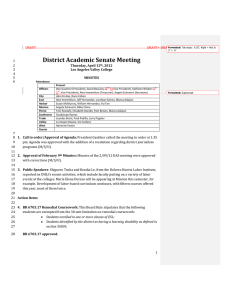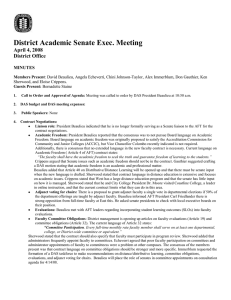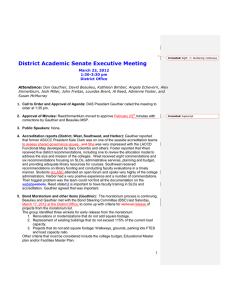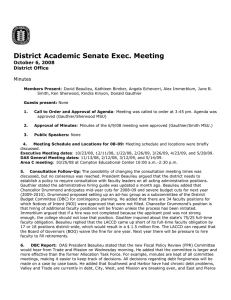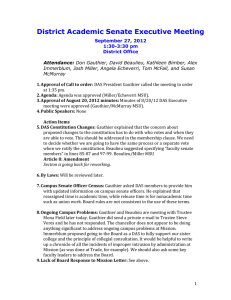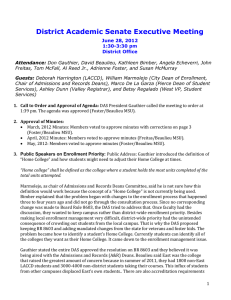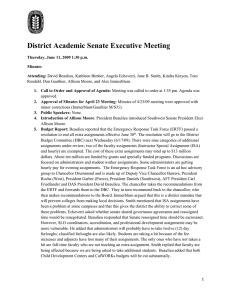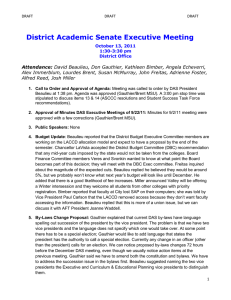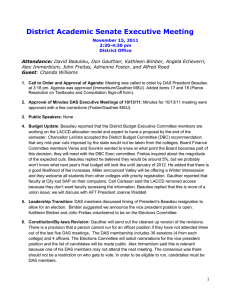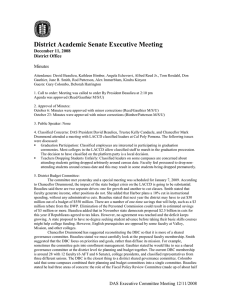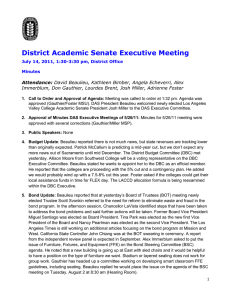District Academic Senate Executive Meeting
advertisement
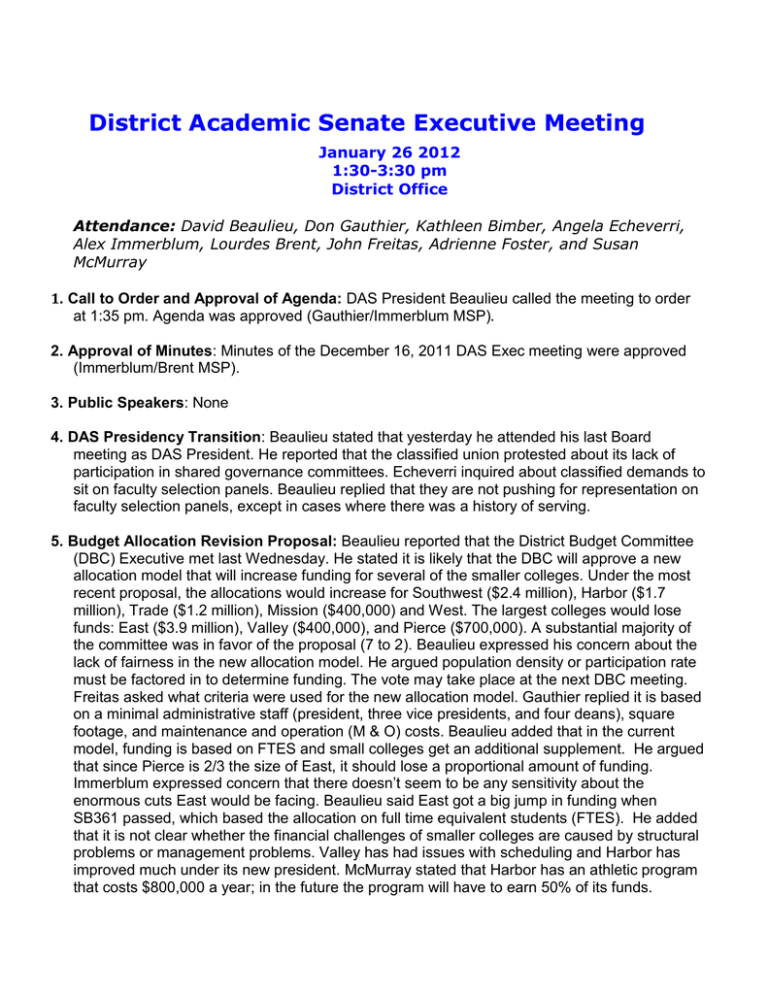
District Academic Senate Executive Meeting January 26 2012 1:30-3:30 pm District Office Attendance: David Beaulieu, Don Gauthier, Kathleen Bimber, Angela Echeverri, Alex Immerblum, Lourdes Brent, John Freitas, Adrienne Foster, and Susan McMurray 1. Call to Order and Approval of Agenda: DAS President Beaulieu called the meeting to order at 1:35 pm. Agenda was approved (Gauthier/Immerblum MSP). 2. Approval of Minutes: Minutes of the December 16, 2011 DAS Exec meeting were approved (Immerblum/Brent MSP). 3. Public Speakers: None 4. DAS Presidency Transition: Beaulieu stated that yesterday he attended his last Board meeting as DAS President. He reported that the classified union protested about its lack of participation in shared governance committees. Echeverri inquired about classified demands to sit on faculty selection panels. Beaulieu replied that they are not pushing for representation on faculty selection panels, except in cases where there was a history of serving. 5. Budget Allocation Revision Proposal: Beaulieu reported that the District Budget Committee (DBC) Executive met last Wednesday. He stated it is likely that the DBC will approve a new allocation model that will increase funding for several of the smaller colleges. Under the most recent proposal, the allocations would increase for Southwest ($2.4 million), Harbor ($1.7 million), Trade ($1.2 million), Mission ($400,000) and West. The largest colleges would lose funds: East ($3.9 million), Valley ($400,000), and Pierce ($700,000). A substantial majority of the committee was in favor of the proposal (7 to 2). Beaulieu expressed his concern about the lack of fairness in the new allocation model. He argued population density or participation rate must be factored in to determine funding. The vote may take place at the next DBC meeting. Freitas asked what criteria were used for the new allocation model. Gauthier replied it is based on a minimal administrative staff (president, three vice presidents, and four deans), square footage, and maintenance and operation (M & O) costs. Beaulieu added that in the current model, funding is based on FTES and small colleges get an additional supplement. He argued that since Pierce is 2/3 the size of East, it should lose a proportional amount of funding. Immerblum expressed concern that there doesn’t seem to be any sensitivity about the enormous cuts East would be facing. Beaulieu said East got a big jump in funding when SB361 passed, which based the allocation on full time equivalent students (FTES). He added that it is not clear whether the financial challenges of smaller colleges are caused by structural problems or management problems. Valley has had issues with scheduling and Harbor has improved much under its new president. McMurray stated that Harbor has an athletic program that costs $800,000 a year; in the future the program will have to earn 50% of its funds. Echeverri stated that one reason Mission usually manages to break even is because it is the only college in the LACCD without an allied health program. Beaulieu reported that the Los Angeles Unified School District (LAUSD) is considering closing its Adult Education and ESL programs. He stated there would be an additional 2.4% cut in revenue to the LACCD because over 70% of our students are getting Board of Governor (BOG) waivers and colleges are not collecting fees from them. 6. Bond Moratorium: The Chancellor recently unveiled the Independent Review Panel Report on the LACCD Building Program (Measures A, AA and J) that was completed in January of 2012. Panel members included John Dacey, Gary Lee Moore, Roberto Barragan, Jim Cowell, Frederick Harris, Karen Hathaway, Robbie Hunter, Sarah Meeker Jensen, and Rita Robinson. Beaulieu stated that the report slams shared governance and highlights cost overruns caused by a very high rate of change orders. The panel recommendations include: Impose a moratorium on all new construction projects and Board directives. The moratorium timeline has not been established yet. There will be two special bond meetings next month to address this issue. We need to develop a list of obvious exemptions; a second list should be developed for those projects that are compelling. Gauthier, Beaulieu, and Joanne Waddell are meeting with Lloyd Silberstein to discuss the moratorium. Gauthier added there are questions about URS because their contract is coming up for renewal. Modify the building program management structure to a more centralized model by instituting more controls and clarifying management responsibilities. Gauthier stated we must decide whether we should continue to operate nine different campus programs or have one or a few campus project managers (CPMs). Take steps to ensure adequate program reserve funds will be in place to finish projects. Gauthier expressed concern about the District Office taking bond funds from colleges. Audit and update financial reports Tighter controls on all change orders Define the proper role of Shared Governance in all phases of construction Reevaluate energy program projects Increase management rigor of $126 million district-wide technology initiatives Freitas distributed and discussed Resolution #03-1112: Bond Project Moratorium and Reallocation of Bond Funds approved by the Academic Senate of Los Angeles City College which states: Resolved: That the Academic Senate of Los Angeles City College opposes any reallocation of Measure J Bond funds that would reduce its existing allocation and thereby prevent completion of vital planned projects; and Resolved: That the Academic Senate of Los Angeles City College requests that the District Academic Senate of the Los Angeles Community College District opposes any reallocation of Bond funds that may cause negative impacts on student learning and success. Beaulieu stated that the rationales for moratorium include: overbuilding (if we build out Southgate and other centers), M&O costs, and an overrun of $140 million in currently planned expenditures. Gauthier stated the moratorium should not be used as an excuse to shift funds from the colleges to the District Office. 7. Districtwide Priority Enrollment Resolution: Vice Chancellor Delahoussaye asked to meet with Beaulieu and Gauthier later today to discuss and respond to the DAS resolution on districtwide priority enrollment approved in December of 2011. They will emphasize how East would be disproportionately impacted by the moratorium, new allocation model, and districtwide enrollment priority. 8. Article 33 Dispute Update: Gauthier reported that he received written confirmation from LACCD Counsel Camille Goulet that confirmed her earlier statements supporting union intrusion into senate matters. Gauthier forwarded her e-mail to ASCCC President Pilati and informed her they would seek a clarification from the California Community Colleges Chancellor’s Office (CCCCO) on this issue. 9. Administrator Evaluations: At yesterday’s meeting the Board instructed the Chancellor to perform comprehensive evaluations on college presidents and senior staff. These will be standard comprehensive evaluations with input from faculty and staff using the process and forms developed during Rocky Young’s administration. Presidents are on three-year contracts, which can be extended. The evaluations have to be completed by June or December of 2013. Deputy Chancellor Adriana Barrera, Vice Chancellor Felicito Cayajon and General Counsel Camille Goulet will also have to undergo comprehensive evaluations. Education Code 1725 states that whenever possible administrative evaluations must include faculty participation. The chancellor and Board are evaluated on a regular basis. Bimber asked if there was an HR guide regarding administrative evaluations, and Beaulieu replied he was not sure. Bimber said it would be helpful to have language on evaluations in the Board Rule for the next generation of faculty leaders. 10. Hiring Guidelines: a. HR-110A Administrative Hiring: Beaulieu reported that they put a sentence back in HR-110A, stating that if the president or vice chancellor will make the final selection he or she will not be a member of the hiring committee. They also clarified language to define “interim” as any temporary position (including acting or substitute). All interim positions will follow the same process. Immerblum said you hire an interim for a year, with a one year extension. HR-110A is in effect now, even for interim positions. Administrators hired through specially funded programs (SFPs) do not have any retreat rights. b. HR-120: Faculty Hiring: Beaulieu reported that this issue has been a bit of a side story. The Human Resources Council made changes to HR-120 when President Chapdelaine was the chair. Barrera claimed that the changes (dated September 14, 2011) were technical. However, there are some substantial issues, such as whether faculty members who are on a probationary committee should be tenured only. Previous language had stated they should be tenured, now it states they can be either tenured or tenure track. Beaulieu speculated they may have wanted to exclude part time faculty from the tenure review committees. We need to decide by February 13th for the HR Council meeting. Months ago Goulet said we had to have a single district policy; it is not clear if it is OK to have 9 variations. Brent said Barrera affirmed that HR-120 would not supersede the local hiring policies as long as they were not in conflict. We may need an ad hoc group because there is also an issue with Instructors Special Assignment (ISAs). The language states that the committee “shall endeavor” to interview at least five candidates. A fewer number of candidates can be interviewed if the president approves, but this means that they don’t have to. Immerblum said we need to see the changes. Beaulieu stated he will send out an electronic version. c. Instructor Special Assignment (ISA) HR-121: The selection procedure is extremely brief. Barrera asked the DAS for some language. Freitas said we need to be careful about who gets hired as ISAs versus coordinators. For the purposes of selection and evaluation it makes a difference. Gauthier stated he made sure all ISAs at Valley are also teaching so they are evaluated by their departments. The contract does not involve the senate for ISAs. 11. Student Success Task Force Recommendations: The LACCD will be asked its opinion on the SSTF recommendations. There are four recommendations that will require legislative changes: allowing for mandatory orientation, registration & assessment, giving CCCCO more power, use of a scorecard (are going to use the ARCC data), and number 2 on list. We will discuss in consultation. 12. Distance Education Committee/Other faculty Contract Issues: Foster asked about the reconfiguration of the DE committee under the new contract. She reported that West will probably go with two separate committees. The new contract has contradictions; its charge is to make policy, etc. What the AFT really wants is a committee with an intentionally narrow range, so that they do not get into evaluation of online faculty, which should be conducted by department chairs. DE will not report to College Council; it continues to report to the Senate EPC and administration. 13. Curriculum Approval at City College: Bimber reported that for the first time in many years, an administrator at City has blocked skill certificates that were well vetted and approved by the local Curriculum Committee. Only recently did the faculty receive a written explanation from Vice President Mary Callahan, but her response lacked a clear rationale. Bimber stated this case involved a skills certificate for liberal studies in dance. She added that skill certificates are defined locally and the state does not interfere as long as they are not called Certificate of Completion, Certificate of Achievement, or Certificate of Competency and are not transcripted. The vice president would not budge on the issue, because she felt queasy about “lying to students”. The language in E-64 is very vague on skill certificates. Freitas wrote a response to all parties involved. Faculty have primacy on curriculum and this issue is going to the chancellor. President Moore wanted to start a task force on Title 5 compliance and how skill certificates should be handled. Bimber said skill certificates can be very effective in helping students get through academic and vocational programs. 14. Senate Reassigned Time: Proposed new language only deals with some DAS officers (president and vice presidents). At this point, each DAS officer is paid by the LACCD and the local campus pays each senate president. Bimber said the AFT just got an additional 8.5 FTEs in reassigned time. She added that the senate needs to be able to do the work it needs to do. Freitas suggested we should put reassigned time for senate officers in the next contract. Immerblum said it is problematic to put this in a Board Rule. Reassigned time guidelines for the two other DAS officers (treasurer and secretary) are missing. 15. Constitution/By-laws Revision: Gauthier stated he had sent out the latest version to everyone. 16. Electronic Textbooks/Homework: Freitas reported that the Physics Chair sent an e-mail about an electronic homework packet (end of the chapter homework). The questions that were raised were whether the sale of a homework packet was in violation of Title 5 and what lasting value it has. Typically students buy a bundle with the textbook and access code. If they buy a used book then they have to buy a separate access code. There is a question as to the legality of this. Freitas asked whether it was OK to list this as “additional materials”. Beaulieu and Bimber replied yes. Another big news item was Apple’s announcement about the introduction of electronic textbooks for middle school and high school. 17. Announcements: a. Consultation: The next DAS consultation with the chancellor is scheduled for 2/13/12. b. Apple Tour: We were invited by the Apple folks to tour their campus during Spring Plenary the Wednesday before the meeting. 18. Treasurer Report: Immerblum reported we have some funds left over because we did not replace half a secretary position. He discussed possible ways to use the leftover funds. We might be able to send a few more faculty to the plenary. On April 27, 3CSN is holding a Math forum. We have tentative plans on April 28th to have a second Math Summit with up to 170 faculty. It costs $5000 to feed 170 people. Brent said the colleges often return part of their professional growth funds (tuition and conference). Others said that is not the case. Gauthier suggested inviting the chancellor to the spring or fall ASCCC plenary. 19. Adjourn: Meeting ended at 4:00 pm. Minutes respectfully submitted by DAS Secretary Angela Echeverri
